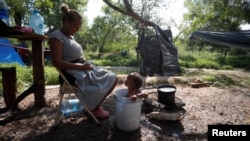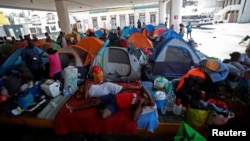On a June afternoon when temperatures climbed near 100 degrees Fahrenheit (38 Celsius), Alejandra Pena gently tipped a jug of water into her son's mouth. Like other children in the migrant camp, a mile-long stretch of tents along the banks of the river separating Mexico from the United States, the toddler had diarrhea. Pena worried the boy was dehydrated.
"Drink, Natanael. Drink," Pena coaxed. One of the few humanitarian groups operating in the camp had told her Natanael was malnourished and underweight, she said, attributing his condition to the lack of clean water and poor sanitation in the camp.
Pena, 34, fled Venezuela after a criminal group killed her sister, according to interviews and police records. Hoping to seek asylum in the United States, she said her family was stuck in northern Mexico because of new U.S. border rules adopted on May 11 by the administration of President Joe Biden.
The rule requires migrants to make an appointment on a government-run smartphone app before approaching the border – but none of the people with Pena has a device.
"We are paralyzed here," Pena said.
Biden, a Democrat, promised to replace the hardline policies of Republican President Donald Trump, including the COVID-era public health order Title 42, with a more humane immigration system.
Title 42 allowed border agents to expel migrants to Mexico without a chance to seek asylum. The new Biden regulation allows migrants once again to ask for asylum at the border but wait in Mexico for a slot on the app or risk a sped-up deportation process that could be conducted while they are held in detention.
Officials said the regulation and other Biden immigration policies are reducing illegal border crossings that have hit record highs in recent years.
But in the first month of the new policy, Reuters interviews with more than 50 migrants, U.S. and Mexican officials, a review of court records and previously unreported data found:
- Tens of thousands of people waiting in dangerous Mexican border towns to snag a spot on the app, according to U.S. and Mexican officials, and warnings from humanitarian groups of deteriorating sanitary conditions at migrant camps;
- A sharp drop in people passing their initial U.S. Citizenship and Immigration Services (USCIS) asylum screenings, down to 46% for single adults from an average of 83% from 2014 to 2019, according to government data contained in a court filing;
- A 35% increase in people detained by U.S. Immigration and Customs Enforcement (ICE), the filing said;
- A sharp rise in time spent in Border Patrol custody, according to previously unreported U.S. government data obtained by Reuters;
- Roughly 50,000 people deported, according to the court filing.
- Migrants who don't use the Customs and Border Protection app, called CBP One, face a higher bar to claim asylum if they passed through another country without seeking refuge there, a standard which critics say mirrors a Trump policy that was blocked by courts.
Those who fail the screening can be deported and banned from entering the U.S. for five years.
A senior Biden administration official told Reuters the policy was working. Government figures show the number of migrants caught crossing illegally has dropped by 69% in one month.
"Our goal is to incentivize people to go through legal channels," said the official, who was granted anonymity as a condition of the interview. "We're seeing, so far, initial positive results."
The U.S. on June 30 increased the number of appointments available on the app to 1,450 a day from 1,250.
The Biden official said the administration is working with shelters and other non-governmental organizations to expand internet access for migrants, adding that there was no need for them to wait in dangerous border towns: "There are plenty of safer parts of Mexico where people can go."
Juan Rodriguez, head of the state-level migrant services agency, said officials visit the Matamoros camp a few times a month to provide water and health services.
The Mexican federal government did not respond to requests for comments on the camp conditions or the regulations.
By mid-June, the population of the Matamoros camp exceeded 5,000, according to Rodriguez, with an additional 3,000 migrants scattered across Matamoros in shelters, hotels, Airbnbs, abandoned houses and an out-of-service gas station, local officials said.
Humanitarian organizations say at times the camp has grown bigger under Biden than during the Trump years.
Approximately 104,000 migrants are amassed in northern Mexico overall, according to U.S. government figures.
After dark
As mosquitos descended at dusk, Pena doused her children in the last of their bug spray. Swollen red bites pockmarked Natanael's face and the bodies of his sisters Nathalya, 11, and Nathaly, 13. Doctors Without Borders (MSF) said they have seen a few suspected cases of malaria and dengue fever.
Nightfall also brings out criminal groups, camp residents say.
Cindy, a 23-year-old from Honduras, hesitated for weeks to approach the U.S. border, even after she was raped repeatedly in the Matamoros camp and in a house nearby by men she believed to be part of a cartel, she told Reuters.
Cindy, who Reuters is identifying only by her first name because of the nature of the attacks, said the men threatened to "disappear" her 3-year-old son if she reported the assaults to Mexican authorities, according to interviews and a written report from the psychiatrist who evaluated and accounts from her attorney.
Desperate after multiple assaults, and unable to secure an appointment on the CBP One app, she and her son walked up to the international bridge on May 21. She said they were allowed to enter and given a notice to appear in immigration court in Houston in August.
Officials and advocates said families are subject to the higher asylum standard but have not been held for in-custody screenings. Cindy was not detained, though she may still have a tough time winning her case in court.
The Mexican state-level security agency did not respond to request for comment about violence in the camp. The Biden administration did not respond to questions about Cindy’s case.
'Part of the enforcement'
The Biden border strategy set a target of 63,000 sped-up screenings for the month of June, more than five times the previous high in July 2019, according to a previously unreported virtual town hall for USCIS officers shared with Reuters.
Asylum division chief John Lafferty told the town hall the administration aims to process migrants for release or deportation within one or two weeks and cut the time migrants have to consult with a lawyer from 48 hours to 24 hours.
Some asylum officers in the meeting raised concerns about the timelines.
In a June 7 filing supporting a lawsuit brought against the regulation by the American Civil Liberties Union and others in U.S. District Court in northern California, the union representing asylum officers said the policy puts "our international and moral commitments at risk."
The government responded in legal filings that the rule was a "well-reasoned border management policy that for the past month and a half has been key to ensuring the continued functioning of the U.S. immigration and asylum system during exigent circumstances while providing ways for vulnerable populations to seek protection."
A spokesperson for the U.S. Homeland Security Department, which oversees USCIS, told Reuters the regulation will reduce the strain on immigration courts by swiftly denying asylum claims with no merit. Lafferty did not respond to a request for comment.








